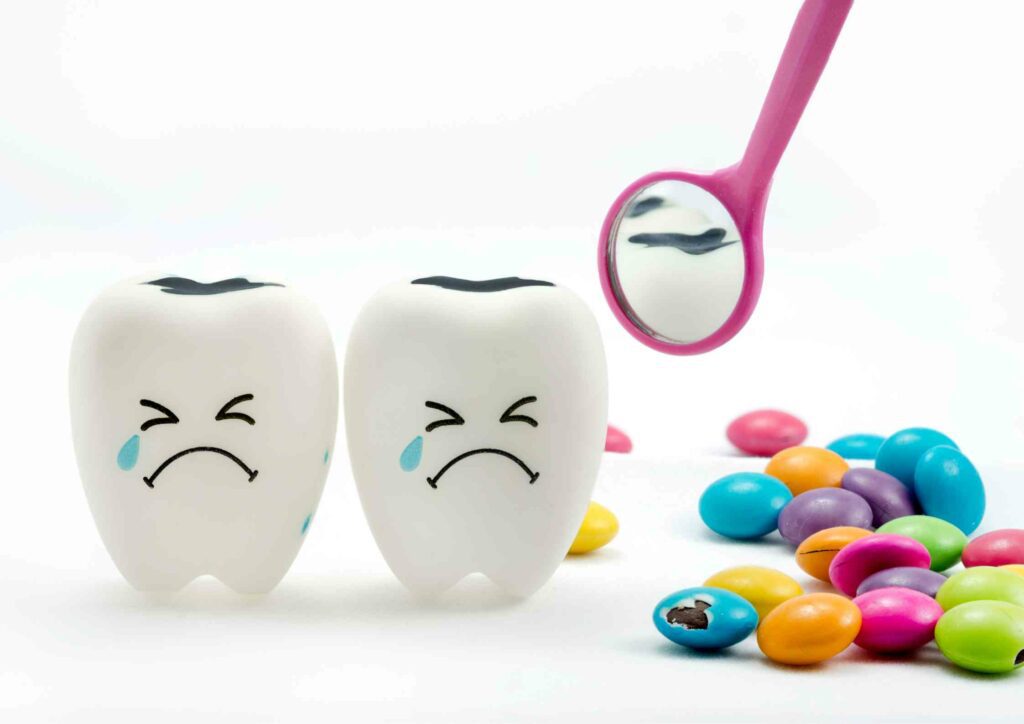Are you worried about cavities? If so, you’re not alone. Oral diseases affect almost 3.5 billion people globally, as reported by the World Health Organization, with dental caries (cavities) in permanent teeth being the most common condition. Despite advances in dental care, cavities still affect many people. It’s important to understand treatment and reversal methods.
A cavity is a hole in a tooth caused by bacteria. If left untreated, it often leads to pain, sensitivity, and infection. Fortunately, there are ways to reverse cavities and protect your teeth from further damage. In this article, we’ll discuss how to reverse cavities and protect your teeth from further destruction.
Causes of Cavities
Cavities are primarily caused by a buildup of dental plaque and poor oral hygiene, but several other factors can contribute to their formation:
- Frequent Snacking: Consuming sugary snacks or drinks can provide a constant food source for bacteria, leading to plaque buildup and eventual tooth decay.
- Dry Mouth: Saliva helps to eliminate food particles and slow down the growth of plaque. Therefore, having a dry mouth—due to certain medications, medical conditions, or simply not drinking enough water—can increase your risk of cavities.
- Lack of Fluoride: Fluoride strengthens tooth enamel and prevents decay. Not getting enough fluoride, whether through toothpaste or drinking water, can leave your teeth more vulnerable to cavities.
- Genetics: Like any health condition, genetics play a role in your susceptibility to cavities. Some people naturally have more acid-resistant tooth enamel or more beneficial oral bacteria, making them less prone to cavities.
Understanding these causes is the first step toward reversing and preventing cavities.
Cavity Diagnosis

The first step in reversing a cavity is getting it diagnosed. Your dentist or trained dental hygienist will examine your teeth for signs of decay and use X-rays to look for cavities beneath the surface. If they find any, they’ll recommend a treatment plan that may include filling in the cavity with a special compound.
Cavity Treatment
The next step in reversing cavities is treatment. Based on the severity of the cavity, your dentist may recommend a filling, root canal therapy, or dental crown.
Using fillings as a treatment option for minor cavities repair is a standard practice. During this procedure, your dentist will remove the decayed part of your tooth and fill it with a material such as composite resin or amalgam. This helps to restore the tooth’s structure, prevent further decay, and provide lasting protection.
When tooth decay is severe, root canals are often suggested. This process entails removing the infected or damaged tissue from the tooth, including the pulp and nerve, and sealing the tooth with the filling. Root canals can relieve pain, prevent tooth extraction, and restore its normal functioning.
Dental crowns, also known as caps, are often used for teeth that are severely damaged or weakened by decay. A crown is a cap fitting over a damaged tooth to improve its strength, protection, and appearance. Crowns are made from various materials, including porcelain, metal, or a blend of both, depending on your specific needs and preferences.
By offering these treatment options, dentists aim to reverse cavities, restore oral health, and preserve natural teeth whenever possible. It is important to consult your dentist to determine the most suitable treatment for your case.
Cavity Prevention
The best way to reverse cavities is to prevent them in the first place. This can be done by following good oral hygiene habits and scheduling regular visits with your dentist.
Brushing your teeth twice daily eliminates plaque buildup, which is the main cause of cavities. Flossing once a day and using mouthwash are also recommended, as these help to reduce bacteria and keep your gums healthy.

Additionally, decreasing the amount of sugar and acidic food in your diet is important, as these can cause enamel erosion over time.
Visiting your dentist on a regular basis is also essential for cavity prevention. During a routine exam, your dentist will check for signs of tooth decay and take preventive measures to protect your teeth from further damage.
Finally, it is important to note that cavity prevention is not only about good oral hygiene and regular checkups. It also involves making lifestyle changes such as quitting smoking and limiting your alcohol consumption.
Home Remedies
You can also try some home remedies to prevent and reverse cavities. Eating a myriad of crunchy fruits and vegetables like apples, celery, carrots, or cucumbers can help scrub away plaque buildup on your teeth. Regularly using fluoride toothpaste can also help protect your teeth from decay.
Natural Remedies
Anecdotal evidence suggests that some natural remedies may help reverse cavities. Oil pulling is an ancient practice of using oil to remove bacteria and reduce plaque buildup on your teeth; all you need to do is swish a tablespoon of coconut or sesame oil in your mouth for several minutes.
Additionally, rinsing your mouth with a homemade mixture of water and baking soda can neutralize acid and reduce plaque buildup.
Note: Don’t underestimate the damage that cavities can cause. Always seek professional help before you resort to natural remedies that may or may not work.
Tips For Keeping Your Teeth Healthy
Incorporating effective oral hygiene routines into your everyday life is crucial to ensure long-term dental health and reduce the risk of cavities. Here are the guidelines for elevating your oral care game, the golden standard your dentist might have mentioned:
- Brush your teeth twice a day for two minutes with fluoride toothpaste.
- Floss daily to remove plaque buildup in between teeth and along the gum line.
- Eat a balanced diet with an assortment of fruits and vegetables, which are naturally high in vitamins and minerals that can help keep your teeth strong.
- Avoid sugary drinks and snacks – these contribute to tooth decay.
- Visit the dentist every six months for a checkup and cleaning, which can help catch any issues early before they become serious problems.
- Use mouthwash regularly to kill bacteria and keep your breath fresh.
- Limit acidic foods, such as soft drinks or citrus fruits, as these can erode enamel and lead to cavities.
- Avoid chewing on hard objects, which can cause chips and cracks in the teeth that may lead to cavities.
- Drink water and stay hydrated to wash away food particles from your teeth.
By following these simple tips, you will keep your teeth healthy and cavity-free, ensuring that your bright smile stays with you.
Cavity-Free Smile
Caring for your teeth by having a regular regimen is paramount for maintaining a healthy, beautiful smile. Brush twice a day, floss regularly, and see the dentist every six months for checkups and cleanings to maintain cavity-free teeth.
Additionally, avoiding sugary foods, using toothpaste recommended by your dentist, limiting acidic foods, and drinking plenty of water can all help protect your teeth from decay.

If you are experiencing any pain or sensitivity in your mouth, it is important to consult a dentist as soon as possible. A dental professional can help diagnose the issue and provide treatment to prevent further damage.
Good luck on your journey to a healthier smile!
Additional Resources
For more information on how to prevent cavities and keep your teeth healthy, here are some additional resources:
- ADA – Dental Care Basics
- CDC – Fluoride Use for Cavity Prevention
- American Academy of Pediatric Dentistry – Kids’ Oral Health
- National Institute of Dental and Craniofacial Research
- American Dental Association – Dental Care Tips
Frequently Asked Questions
Below are some of the most frequently asked questions about cavities and their reversal:
Q: Can cavities be reversed?
A: While it’s true that once a cavity has formed, it cannot be reversed or healed on its own, there are steps you can take to stop the decay from progressing further, potentially avoiding the need for a filling.
The initial stage of cavity formation involves the softening of your tooth enamel due to acids produced by bacteria in your teeth. This stage can be reversed by re-mineralizing your teeth through good oral hygiene practices and a healthy diet.
However, once the decay has passed through your enamel into the inner parts of the tooth, a filling by your dentist is necessary to prevent further decay and potential loss of the tooth. It’s always best to consult with a dental professional at the first sign of dental discomfort or worry.
Q: How often should I go to the dentist?
A: Dentists typically recommend visiting their dental chair at least twice a year for exams and routine cleanings. You may require more frequent visits if you are at risk for cavities.
Q: What are the best ways to treat cavities?
A: The treatment for cavities depends on how severe they are. Mild to moderate cases may be treated with fillings or composite restorations. Severe cases may require root canals, crowns, or even extractions. Your dentist can assess your cavities to determine the best treatment plan.
Q: What are the consequences of leaving cavities untreated?
A: If left untreated, cavities can cause serious damage to your teeth and gums. They can lead to pain, infection, tooth loss, and other oral health problems. It is important to treat cavities as soon as possible to prevent further damage.
Q: Is it possible to reverse cavities naturally?
A: While some natural remedies may help promote oral health, they are not a substitute for professional dental care. Reversing cavities requires professional treatment and regular care from your dentist.





















